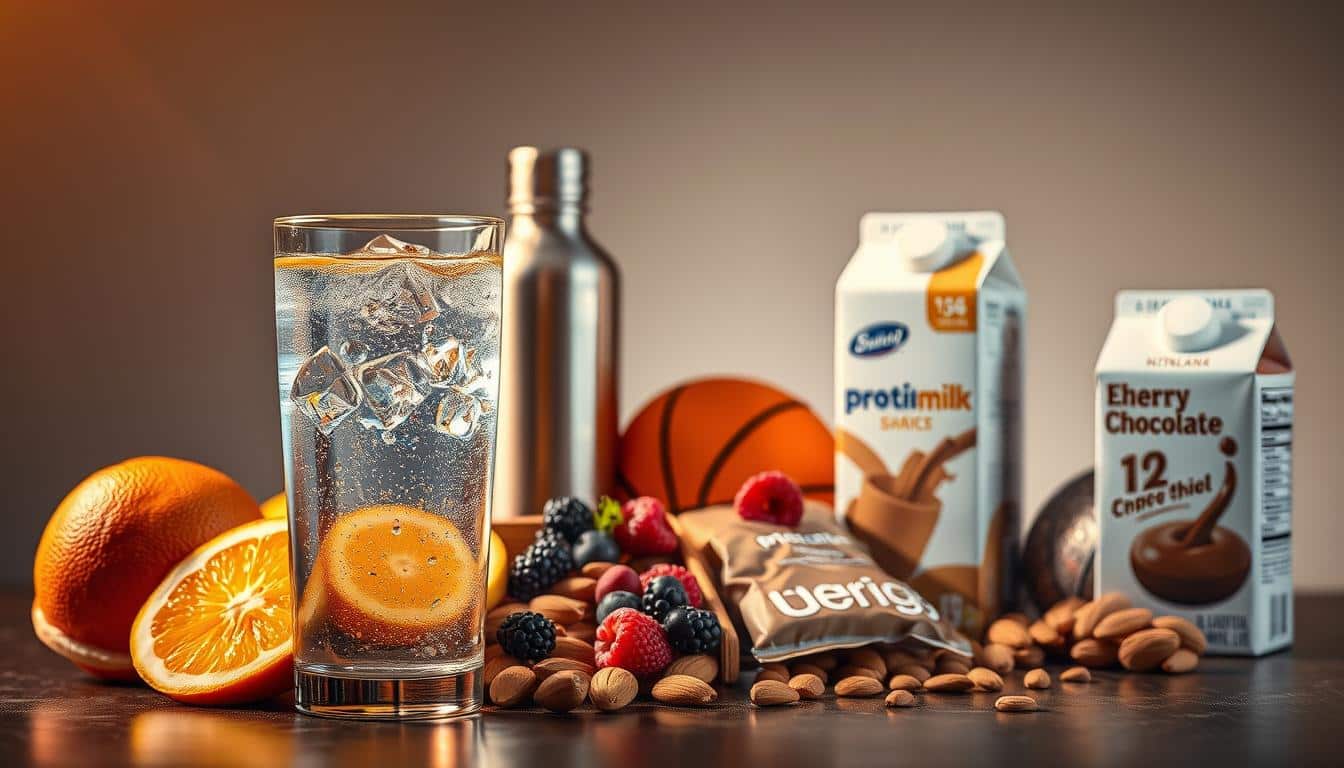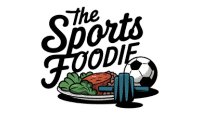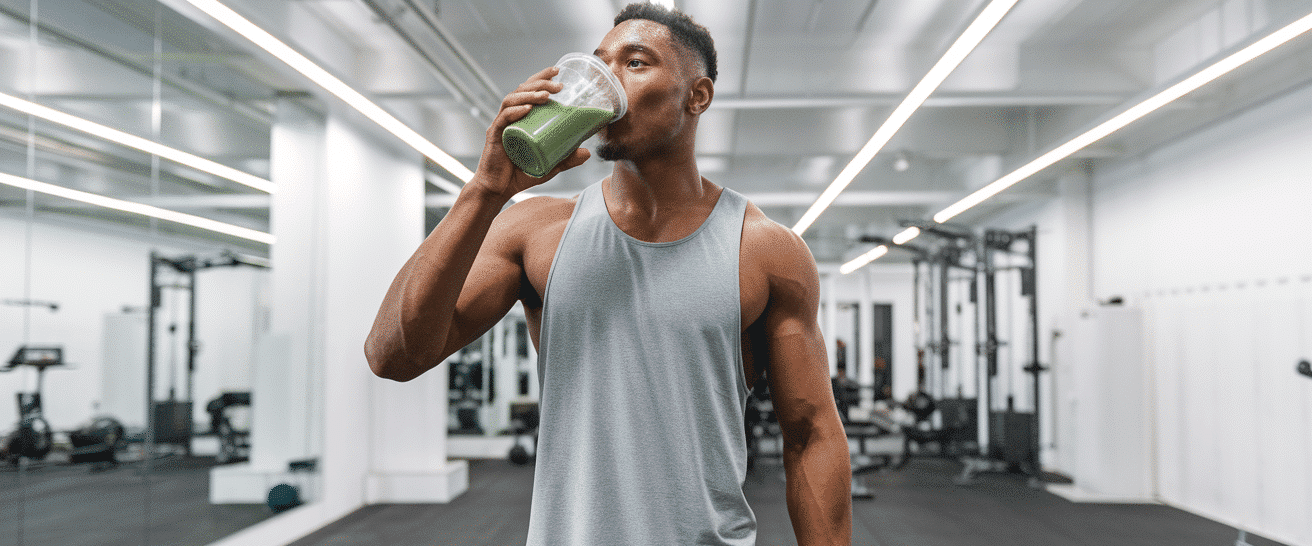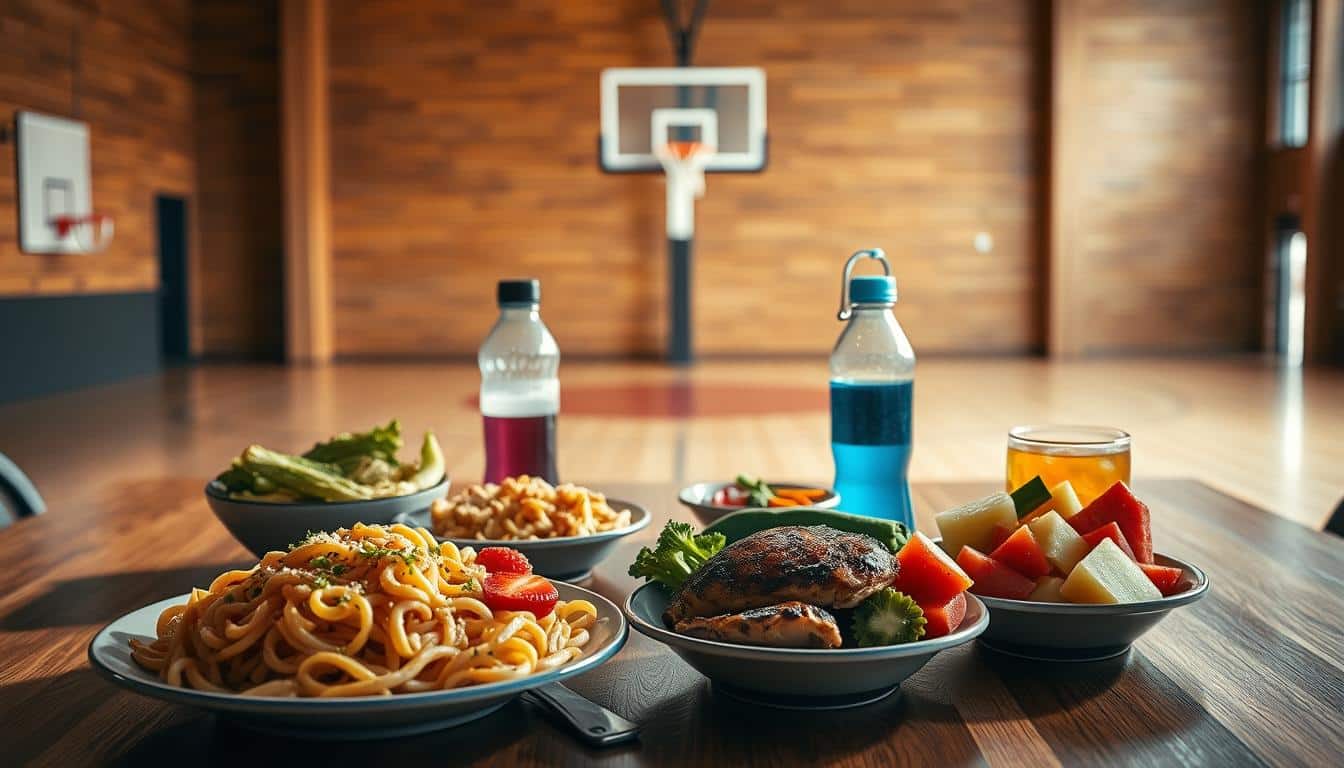Most experts say your last full plate should land about three hours before tip-off. That timing helps your body digest and deliver steady energy. You get fuel without a heavy stomach.
Think simple. Aim for carbs, lean protein, and a starchy side like a sweet potato. An example is 4–8 oz chicken or steak, a baked sweet potato, a banana with peanut butter, and water. Night-before options include teriyaki chicken rice bowls, spaghetti with meat sauce, or soft tacos.
Hydration matters. Have at least 20 oz with your meal. Drink 4 oz every 15–20 minutes during play. If the game lasts over 60 minutes, plan 20–32 oz of a sports drink per hour.
This guide gives clear steps so you can build a plate fast. You eat to boost energy, protect performance, and keep your stomach calm on game day. Follow the same routine in practice so your body learns the rhythm.
Game day nutrition basics for basketball players
A simple plate split keeps energy steady through short bursts and long runs.
Carbs act as the primary fuel during high-intensity exercise. Make half your plate carbs like pasta, rice, potatoes, oats, or bread. These give quick, usable energy when you sprint or jump.
Reserve one quarter of the plate for lean protein. Choose chicken, turkey, fish, eggs, or yogurt. Protein supports repair and recovery after tough reps.
The last quarter is vegetables and fruit. These add vitamins, minerals, and fiber to keep energy steady and digestion smooth.
Hydration goals with water and sports drinks
Drink at least 20 oz of water with the meal 3–4 hours before the game. During play, sip about 4 oz every 15–20 minutes. If play runs over 60 minutes, switch to a sports drink and target 20–32 oz per hour to replace electrolytes.
- Keep portions balanced so your stomach feels light and ready.
- Avoid large fat servings right before play; fat slows digestion.
- Practice this plan on training days so you know how foods feel.

| Plate Portion | Examples | Main Benefit | When |
|---|---|---|---|
| Half carbs | Pasta, rice, potatoes, oats | Primary fuel | Days leading up and meal 3–4 hrs prior |
| Quarter protein | Chicken, fish, eggs, yogurt | Repair and recovery | Every main plate |
| Quarter veg/fruit | Leafy greens, berries, bananas | Vitamins, minerals, fiber | Daily |
| Hydration | Water, sports drink | Fluid and electrolyte balance | 20 oz with meal; sip during play |
Days and night before game day: build steady energy
Plan predictable plates the day and night before to lock in energy. Keep portions consistent so your stomach stays calm and your body stores glycogen.
Use the plate guide: half carbs, one quarter lean protein, and one quarter vegetables or fresh fruit. Aim for 1–2 cups of rice or pasta and 4–6 oz of protein at dinner. Add beans, a salad, or a slice of bread if you need extra carbs.
Choose simple dinners like pasta with red sauce, a teriyaki chicken rice bowl, or soft tacos. These combine pasta or rice, lean protein, and produce in one easy plate. Keep sauces light to avoid slow digestion.
Evening snacks should sit well. Try a peanut butter sandwich, a yogurt parfait, cereal with milk, or a granola bar. Keep portions small and skip greasy or heavy foods that can linger.

- Aim for 7–8 hours of sleep to help recovery and refill energy stores.
- Pack travel snacks like trail mix or granola bars if you travel the day of the game.
- Test these foods in practice so you know what works on game day.
Portion quick-reference
| Item | Amount | Main benefit |
|---|---|---|
| Rice or pasta | 1–2 cups | Carb energy |
| Lean protein | 4–6 oz | Repair and steady fuel |
| Veggies / fruit | 1 cup | Vitamins and digestion |
pre match meal for basketball players: 3-4 hours before tip-off
Plan this big plate three to four hours ahead to give your body steady fuel.
Build the plate with whole grains, lean protein, veggies, and a potato or rice to top off glycogen. Aim for 1–2 cups of brown rice or whole wheat pasta. Add 3–4 oz of grilled chicken or grilled fish, or a turkey or roast beef sandwich on whole wheat.
Include about 1 cup of vegetables and a baked or mashed potato or sweet potato. Keep sauces and butter light so fat stays low and digestion stays quick.
Drink at least 20 ounces of water with this meal. Keep sipping water through the hours before tip-off so you stay hydrated.
Quick menu ideas
- Grilled chicken + brown rice + steamed vegetables + small baked potato.
- Grilled fish rice bowl with light sauce and a side of greens.
- Turkey or roast beef sandwich on whole wheat with a fruit cup and carrots.
| Item | Amount | Main benefit | Notes |
|---|---|---|---|
| Whole grains (brown rice/pasta) | 1–2 cups | Top off glycogen | Choose brown rice or whole wheat pasta |
| Lean protein (chicken/fish/turkey) | 3–4 oz | Repair and steady fuel | Grilled or roasted, low fat |
| Potato / sweet potato | 1 medium | Extra carbs and potassium | Baked or mashed, light butter |
| Vegetables | ~1 cup | Vitamins and digestion | Leafy greens or mixed veg |
Need quick ideas for the day? Check these high-energy breakfast ideas to pair with your routine and set energy for game time.
One hour pre-game and during the game: quick fuel and fluids
In the last hour, quick carbs and measured sips keep you sharp.
Grab a small snack about 60 minutes before the game. Choose fruit, pretzels or crackers, or a granola bar. These snacks give fast energy without a heavy stomach.
Drink 8–10 oz of water with that snack to top off fluids. During the game, sip about 4 oz every 15–20 minutes. This helps replace sweat and keeps focus.
- You boost quick energy with a small snack one hour before tip-off.
- You choose fruit, pretzels or crackers, or a granola bar because carbs digest fast and sit well.
- Drink 8–10 ounces of water with that snack to top off fluids before warmup.
- Avoid high fat and high protein foods close to tip-off; they slow digestion and can upset your stomach.
- Keep peanut butter small or skip it if your stomach feels sensitive; avoid heavy peanut servings.
- Follow an in-game fluid plan: ~4 oz every 15–20 minutes during play.
- If play runs longer than 60 minutes, add sports drinks and aim for 20–32 oz of sports drink per hour.
- Keep simple carb snacks on the bench and do not reach for rice or heavy foods during game time.
| When | What | Amount |
|---|---|---|
| 1 hour before | Fruit, pretzels, granola bar | Small portion + 8–10 oz water |
| During game | Water sips | 4 oz every 15–20 min |
| >60 min play | Sports drink | 20–32 oz per hour |
What to skip for better performance
Skip foods that slow digestion to keep your energy sharp and your stomach calm.
Fried foods and high fat choices
Avoid fried items and other high fat choices. They slow digestion and can leave you feeling heavy.
That heaviness often lowers performance and makes quick movement harder.
Soft drinks, energy drinks, and high sugar snacks
Skip sugary drinks and candy close to tip-off. They give a fast energy spike then a steep crash.
That crash can make you feel drained during the game.
Large dairy servings right before play
Big servings of milk or yogurt may upset your stomach if you are sensitive. Keep dairy small or eat it earlier in the day.
Save creamy sauces and butter for after the game. They add fat and slow digestion.
- Watch peanut portions if they sit heavy; have them earlier rather than right before activity.
- Use a simple rule: greasy, super-sweet, or carbonated items rarely help your pre routine.
- Test new foods during practice, not on game day, and pick grilled, baked, or steamed options when possible.
| Avoid | Why | Better choice |
|---|---|---|
| Fried and high-fat foods | Slow digestion; heavy feeling | Grilled chicken, baked potato |
| Soft drinks & energy drinks | Quick spike then crash | Water or diluted sports drink |
| Large milk or yogurt servings | Can upset stomach | Plain yogurt earlier in the day |
Simple nutrition planning beats scrambling. Pack smart snacks and read menus so you aren’t stuck with convenience foods that slow you down.
Conclusion
Finish strong by treating nutrition like a practiced skill. Eat your main plate 3–4 hours before game day tip-off. Use whole grains, lean protein, and vegetables. Drink at least 20 oz of water with that plate.
Have a small snack one hour out. Choose quick carbs like fruit, toast, or cereal. Sip 4 oz of fluid every 15–20 minutes during play. If play lasts over 60 hours, switch to 20–32 oz of sports drinks per hour.
Keep your breakfast steady on tournament mornings. Pick toast or bread, eggs, yogurt, or cereal. Pack travel snacks like fruit and yogurt so meals stay on schedule.
Quick checklist: repeat this routine in training, favor pasta, rice, potatoes, chicken, turkey, fish or beef as needed, keep sauces light, and note how you feel at the final buzzer. Adjust portions and keep improving.


